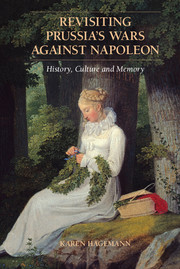Book contents
- Frontmatter
- Epigraph
- Contents
- List of Figures and Maps
- List of Abbreviations
- Acknowledgments
- Revisiting Prussia’s Wars against Napoleon
- Part One A History of Defeat, Crisis and Victory
- Part Two Discourses on the Nation, War and Gender
- Part Three Collective Practices of De/Mobilization and Commemoration
- Part Four Literary Market, History and War Memories
- Part Five Novels, Memory and Politics
- Epilogue Historicizing War and Memory, 2013–1813–1913
- Bibliography
- Name Index
- Subject Index
- Plate section
Part Two - Discourses on the Nation, War and Gender
Published online by Cambridge University Press: 05 March 2015
- Frontmatter
- Epigraph
- Contents
- List of Figures and Maps
- List of Abbreviations
- Acknowledgments
- Revisiting Prussia’s Wars against Napoleon
- Part One A History of Defeat, Crisis and Victory
- Part Two Discourses on the Nation, War and Gender
- Part Three Collective Practices of De/Mobilization and Commemoration
- Part Four Literary Market, History and War Memories
- Part Five Novels, Memory and Politics
- Epilogue Historicizing War and Memory, 2013–1813–1913
- Bibliography
- Name Index
- Subject Index
- Plate section
Summary
Discourses on the Nation, War and Gender
In his “List of Historical-Political Writings Censored in the Month of February 1815,” the Prussian censor Heinrich Renfner complained once more about the monotony of the literary products he was compelled to read. The occasion for his lament was an article by the Berlin history professor Friedrich Rühs, “On the Unity of the German People,” in the Zeitschrift für die neueste Geschichte, die Staaten- und Völkerkunde. This journal of contemporary history and politics was published by Georg Andreas Reimer, one of the leading publishers in the Prussian capital, from 1814 to 1816. In his article Rühs supported the reconstitution of a German empire. As long as political circumstances rendered this impossible, unity could only be created and maintained by the agreement of the German people. To this end, all Germans must be regarded as compatriots and attain the same rights in each German state, for which universal legislation was necessary. Rühs suggested establishing a federal council of German states with Austria and Prussia at the helm. The states would have a common foreign policy toward non-German states, and henceforth no individual member would be permitted to maintain envoys at foreign courts. The defense of the German fatherland would be secured by a reorganization of military affairs, with a general militia as its main element. To make German men better able to defend their country, they should undergo regular military training during peacetime. Fostering a sense of common purpose among all Germans, Rühs believed, demanded instruction in German history, the promotion of German language and customs and the introduction of a German national costume and festivals. As Renfner commented tersely on the essay, “All in all, the same suggestions we have already read in a hundred pamphlets and presumably will read again ad nauseam usque.” In fact, we can find similar recommendations in many other pamphlets, broadsheets, magazines and newspapers of the time. If we look at the range of political literature, it soon becomes apparent that much of what Arndt, Fichte or Jahn – the best known German-national authors of their time – wrote in their texts was also shared by many less famous contemporary authors.
- Type
- Chapter
- Information
- Revisiting Prussia's Wars against NapoleonHistory, Culture, and Memory, pp. 75 - 78Publisher: Cambridge University PressPrint publication year: 2015
- 1
- Cited by



